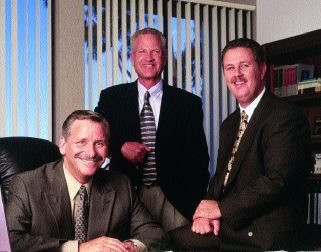
Tribal First meets the unique needs of tribal groups
By Dave Willis

Affinity Insurance Services, LLC, and Tribal First executives Glenn A. Chapin (left), vice president; and Sean McConlogue, ARM, president, with one of their clients, Karol Schoen, general manager of the Barona Casino in San Diego.
 Sean McConlogue and Glenn Chapin love what they do, and it shows. Sean, president of Affinity Insurance Services, LLC, and Glenn, vice president, talk with passion about their market. "Glenn and I have said we would have left the insurance business years ago if we didn't do what we do," Sean says, speaking of the niche market they serve.
Sean McConlogue and Glenn Chapin love what they do, and it shows. Sean, president of Affinity Insurance Services, LLC, and Glenn, vice president, talk with passion about their market. "Glenn and I have said we would have left the insurance business years ago if we didn't do what we do," Sean says, speaking of the niche market they serve.
Affinity is the largest provider of P&C insurance to Indian Country--tribal governments and related entities, according to Sean. Those who know the market may not recognize the name Affinity. That's because its wholesale and retail brokerage operates under the trademarked name, Tribal First.
In 1999 Sean led a management buyout of the San Diego-based Affinity from its parent company, which was based in Los Angeles. The parent firm had purchased Affinity in the mid-1990s from a national brokerage. The Indian Country program goes back to those days.
"We started the tribal program in 1993, together," Glenn says of their history in the business. Today, Affinity serves 250 tribal enterprises nationwide, representing about 150 tribes.
Affinity offers a first-dollar package program through various carriers, and proprietary first-dollar workers comp and self-insurance products. The operation consists of 26 people--not many, considering its reach. The brokerage has a unit focused on wholesale business, one unit focused on retail, and one that underwrites its workers comp program.
Affinity also administers claims. "Due to our specific focus on Indian Country, we needed a specific group of claims people who knew how to handle tribal business," Sean adds. He uses a national firm for remote assignments.
Twenty percent of policies the brokerage writes--and 40% of the revenue--are retail. The balance
is wholesale.
 Sean McConlogue (left) and Glenn Chapin (right) meet with Tom Corbett, chairman/CEO of Driver Alliant Insurance Services, Inc.
Sean McConlogue (left) and Glenn Chapin (right) meet with Tom Corbett, chairman/CEO of Driver Alliant Insurance Services, Inc.
Business is mostly in the West. "We are heavily concentrated in the crescent that starts in Washington state and ends up in Arizona," Sean notes. Glenn adds, "Look at Indian Country, and you see a high concentration of tribes in that same crescent." There are 107 recognized tribes in California, they say, a third of the total in the lower 48 states. Affinity also writes "in Rhode Island, Maine, Massachusetts, and all points in between," Sean says.
Casinos, but not just
Gaming operations put tribal entities on the radar screen of many vendors who see a lucrative market opportunity. That makes it difficult for tribal leaders to know whom to trust for insurance needs as well as other products and services. "The tribe might have had nothing yesterday and have a $200 million casino today," Sean says. "One of the very important factors of doing business in Indian Country, I suppose like any other business, is developing relationships," he says. Casinos, while very visible, have served as springboards to other growth.
"Tribal governments are growing, and with their increased revenues, they're building more roads, more schools, clinics and civic centers, and things of that nature," Sean says. "A lot of that expansion is due to either the casino or other enterprises they've put together, from convenience stores to wiring harness plants for Ford and Chrysler.
"The tribes, from a diversification standpoint, are brilliant," he observes. Tribes recycle their revenues back into greater diversification. "Revenue from the casino builds the tire recycling plant or water bottling plant, and infrastructure, like wireless systems and phones and housing," Sean says.
One tribe diversified into a port of entry for trading goods. Glenn explains: "They've parlayed their sovereign nation status into becoming a free-trade-zone port of entry. They're exercising their ability to be a governmental entity."
Although Affinity operates in the United States, it has to operate like an international broker in some ways. "Indian Country is different from all other insurance business in the United States," Sean says. "It's almost like having 320 different additional states. Sovereignty puts the tribe on par with state government in many respects." Insurance is one.
Understanding the differences
As sovereign dependent nations, tribes are subject to Congress, but not to most other governing entities. "That allows them to do things differently," Sean says. "They can create their own legal structure--and many of them have. They have their own court systems and their own definition of tort liability. That plays into the insurance we sell. Our products dovetail with tribal laws."
According to Glenn, this status affects how someone might fare upon incurring a loss or having an accident on tribal property. "If you tried to sue the tribe, you would be unable to do so, under the scope of what you'd be used to," he says. "If you wanted to sue, you'd have to go to the tribal court system and/or the tribal appeals process and be subject to that." Understanding such differences is important when specializing in insurance for tribal entities, Glenn notes.
Workers comp is different, also. "Our workers compensation product is written outside the state system--but with A-rated carriers, so the protection is there," Sean says. The product "recognizes the jurisdiction of the tribe, rather than the jurisdiction of that particular state."
Other differences exist, too, such as loss control. "Loss control becomes quite an involved service," Glenn says. Although state and federal OSHA regulations exist, for instance, "tribes are not subject to or legally bound by either," he says. They often--but not always--mirror state or federal OSHA. "When you do loss control on a reservation, you need to know their requirements."
The same holds true with the Americans with Disabilities Act and building codes. "They are not subject to ADA, but they mirror it," Glenn adds. "And they don't have to go down to the municipality to get a permit to build a casino," he notes. That said, tribes often compact with state governments, particularly when it comes to gaming operations, and they may agree to limit sovereignty and comply with local regulations.
Tribal sovereignty helps create a keen interest in self-insurance among Affinity's clients, particularly the larger ones. "In Indian Country,
they care very much about their sovereignty," Sean explains. "They care about what's called self-determination. A self-insurance product will manifest both their sovereignty and their
self-determination." Affinity's
self-insurance product features specific reinsurance and an aggregate cover with A-rated paper. Plus, Affinity handles the claims.
Knowledge brings value
Sean and Glenn speak proudly of another Affinity offering--intellectual capital. "We try to serve the middle market with all the risk management and tribal information they need," Sean says. "We do that for the retail clients and wholesale clients, through seminars, and through client roundtables, which bring together clients from geographic area.
 Tribal First staff includes Nina C. Reznicek, CRM, WCCP, program manager, and Raedeen G. Ayub, package program manager.
Tribal First staff includes Nina C. Reznicek, CRM, WCCP, program manager, and Raedeen G. Ayub, package program manager.
"Intellectual capital is certainly a subjective concept, but it becomes objective when the rubber meets the road with the retail broker and the client," Sean says. Retail brokers often don't have a depth of knowledge in Indian Country issues. "The intellectual capital in this particular niche business becomes a very big deal," he adds.
"We also provide sales support to our wholesale network," he says. "We are pleased to go out with our broker partners and present our products to the ultimate clients."
Affinity supplements direct support with online claims reporting for liability and workers comp. Clients can view status, get adjuster notes, or print loss runs or other risk management info. "All of those are provided to our clients, whether they're broker clients to assist their insureds or whether it's the ultimate insured themselves," Sean says.
Dealing with Indian Country clients takes more than just products and services. Sean says: "What we bring to the Indian Country is a 'servant attitude' and flexibility. We've found that the greatest detractor to successfully servicing tribal clients is something that insurance is known for, and that is arrogance and inflexibility." He says these negative traits manifest themselves more readily in a hard market, such as the one that's under way.
Continued growth anticipated
Sean and Glenn expect growth to continue, partly because the market is growing, but also because the company was purchased earlier this year by a Connecticut firm that's building a distribution system which should broaden Affinity's reach.
The firm, Alliant Resources Group, has been around for just a few years, but it already has made inroads into the brokerage distribution business with acquisitions of Robert F. Driver, a California-based broker, and Michigan-based insurance agency Kelter-Thorner. Driver, now Driver Alliant Insurance Services, Inc., focuses on several niche markets, particularly public entity business. Kelton-Thorner is big in lawyers professional liability and real estate industry insurance.
Alliant President John Addeo saw a strong past and bright future in Affinity. "The very senior guys were the kind of people we thought would fit our profile," John says. "Leaders, people of high integrity, people who have demonstrated that they can successfully grow and manage their business. That, coupled with the fact that they have a specialty niche in a particular segment of our business was what attracted us."
John, who formed Alliant after leading USI Holdings, an independent brokerage, wants to spread Affinity's expertise to others in his network. "We're already beginning that process," he says. For instance, although the company doesn't have a property/casualty operation on the East Coast, it's beginning to lay the groundwork for getting into the tribal casinos there. "That's the process we're going to use as we continue to grow throughout the country," John says.
"We're looking to partner with 12 or 13 firms," he says, describing what his network might ultimately look like. "All will have a leading position in a geographic area of the country and have outstanding management teams that can continue to grow and prosper and run their business. We're not looking for people to sell their business and retire. That's not our play.
"Once we get these companies in, we want to begin making available to them the products we've acquired through other agencies, for instance Affinity with the casino business," John continues.
Sean believes the time is right to build the business and grow it through the network. "It's an exciting time to be involved in Indian Country because of the growth in tribes, the diversification of tribes and the growth of their insurance exposures," he says. "It's absolutely fascinating to deal with the uniqueness of Indian Country."
Expect that excitement to rub
off on some of his new Alliant network partners. *
The author
Dave Willis is a New Hampshire-based writer who edits www.RoughNotesToday.com, an online daily news service for agents. He is a co-founder and former editorial director of PropertyAndCasualty.com. Previously, he wrote for national and regional business and nonprofit publications and has held senior communication positions for a large global insurer and a respected insurance professional society.
"Indian Country is different from all other insurance business in the United States ... Sovereignty puts the tribe on par with state government in many respects."
--Sean McConlogue, President
Affinity Insurance Services, LLC